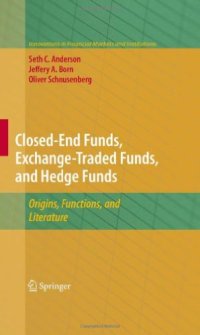
Ebook: Closed-end funds, exchange-traded funds, and hedge funds: origins, functions, and literature
- Genre: Economy
- Tags: Business/Management Science general, Finance /Banking
- Series: Innovations in financial markets and institutions 18
- Year: 2010
- Publisher: Springer US
- City: New York; London
- Edition: 1
- Language: English
- pdf
Closed-End Funds, Exchange-Traded Funds, and Hedge Funds: Origins, Functions, and Literature is a concise and valuable book that will be of interest to individual investors, financial professionals, and academic researchers, alike. It provides a brief history and institutional discussion of these investment companies and also presents a summary of the research on these funds. Investment practitioners will find the book useful as a reference and as a quick refresher on the current state of knowledge regarding each fund type. Equally important, it provides academic researchers with an accurate institutional framework within which to cast their theoretical models, and a point of departure for expanding the empirical analysis for improving our understanding of these funds. All-in-all, this is a very valuable book; I highly recommend it.
John J. Jackson
Professor of Economics
Auburn University
Professors Anderson, Born, and Schnusenberg provide a valuable service in this monograph. The practical significance of closed-end funds, exchange-traded funds, and hedge funds has increased dramatically in recent years, but all too many academics and investors know little about them. This text presents a carefully-focused and understandable description of these investment vehicles, highlighting the big, unresolved questions, while also including careful and fair accounts of the state of the literature. Nothing extraneous clutters the presentation, but, more importantly, nothing necessary is left out. Highly recommended.
T. Randolph Beard
Professor of Economics and Public Policy
Auburn University
This book is both useful as a reference book and as an additive, educational overview of ETFs and hedge funds, as well as CEFs. In today’s tumultuous markets, much reference is made to these subjects without a clear understanding of the vehicles, their structure and their history. This is a very timely publication and should be viewed as an important read. The book contains definitive explanations and also includes an excellent summary of past works in this area. Readable, informative and highly useful as a reference source.
Kathleen A. Wayner
President and CEO
Bowling Portfolio Management